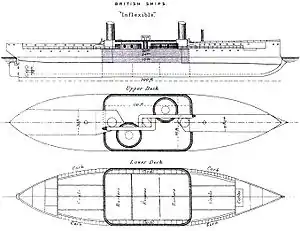
A schematic of HMS Inflexible depicting her rectangular citadel in the centre

Citadel door on USS New Jersey
In a warship an armored citadel is an armored box enclosing the machinery and magazine spaces formed by the armored deck, the waterline belt, and the transverse bulkheads.[1] In many post-World War I warships, armor was concentrated in a very strong citadel, with the rest of the ship virtually unprotected, which was found to be the most effective defence; this is referred to as all or nothing armor.
In a civilian ship a citadel is a secure space equipped with means of communication and emergency supplies, used typically in case of piracy.[2][3]
See also
Citations
- ↑ Raven and Roberts, p. 9
- ↑ "Crew of heavy-lift ship freed after hijacking". professionalmariner.com. Professional Mariner. May 7, 2019.
- ↑ "Tanker stowaways: 'Hijacking' ends after special forces storm ship". bbc.co.uk. BBC. October 26, 2020.
Bibliography
- Raven, Alan; Roberts, John (1980). British Cruisers of World War Two. Annapolis, MD: Naval Institute Press. ISBN 0-87021-922-7.
This article is issued from Wikipedia. The text is licensed under Creative Commons - Attribution - Sharealike. Additional terms may apply for the media files.